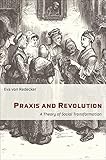Praxis and Revolution : A Theory of Social Transformation / Eva von Redecker.
Material type: TextSeries: New Directions in Critical Theory ; 71Publisher: New York, NY : Columbia University Press, [2021]Copyright date: 2021Description: 1 online resourceContent type:
TextSeries: New Directions in Critical Theory ; 71Publisher: New York, NY : Columbia University Press, [2021]Copyright date: 2021Description: 1 online resourceContent type: - 9780231198226
- 9780231552547
- 361.2 23
- HM876 .R425 2021
- online - DeGruyter
| Item type | Current library | Call number | URL | Status | Notes | Barcode | |
|---|---|---|---|---|---|---|---|
 eBook
eBook
|
Biblioteca "Angelicum" Pont. Univ. S.Tommaso d'Aquino Nuvola online | online - DeGruyter (Browse shelf(Opens below)) | Online access | Not for loan (Accesso limitato) | Accesso per gli utenti autorizzati / Access for authorized users | (dgr)9780231552547 |
Frontmatter -- Contents -- Preface to the American Edition -- Preface to the German Edition -- Introduction “. . . It Is a Revolution” -- Part 1 Maria’s Ménage and the Transience of Heterotopian Praxis -- Introduction -- 1 The Rules of Praxis -- 2 The Materiality of Praxis -- 3 The Connections Between Practices -- Part 2 Jacobin Knitters and the Tracks of Structuration -- Introduction -- 4 The Duality of Social Structures -- 5 Recognition and Performative Structuration -- 6 Structures in Three States of Aggregate -- Part 3 Marta’s Invisible Affinity Group and Interstitial Upheavals -- Introduction -- 7. Disaggregation: Performative Critique and the Laughter of Mimesis -- 8. Constitution: Subcollective Association -- 9. Contamination: Overlaying Structures -- Part 4 The Execution of the Marquise and Metaleptic Paradigm Shifts -- Introduction -- 10 Paradigm Shifts as a Gradual Replacement of Anchoring Practices -- 11 The Revolutionary Emergence of the Concept of Revolution -- 12 Metaleptic Dynamics -- Conclusion: “The Difficulties of the Plains” and the Revolutionary Tradition -- Notes -- Bibliography -- Index
restricted access online access with authorization star
http://purl.org/coar/access_right/c_16ec
The concept of revolution marks the ultimate horizon of modern politics. It is instantiated by sites of both hope and horror. Within progressive thought, “revolution” often perpetuates entrenched philosophical problems: a teleological philosophy of history, economic reductionism, and normative paternalism. At a time of resurgent uprisings, how can revolution be reconceptualized to grasp the dynamics of social transformation and disentangle revolutionary practice from authoritarian usurpation?Eva von Redecker reconsiders critical theory’s understanding of radical change in order to offer a bold new account of how revolution occurs. She argues that revolutions are not singular events but extended processes: beginning from the interstices of society, they succeed by gradually rearticulating social structures toward a new paradigm. Developing a theoretical account of social transformation, Praxis and Revolution incorporates a wide range of insights, from the Frankfurt School to queer theory and intersectionality. Its revised materialism furnishes prefigurative politics with their social conditions and performative critique with its collective force.Von Redecker revisits the French Revolution to show how change arises from struggle in everyday social practice. She illustrates the argument through rich literary examples—a ménage à trois inside a prison, a radical knitting circle, a queer affinity group, and petitioners pleading with the executioner—that forge a feminist, open-ended model of revolution.Praxis and Revolution urges readers not only to understand revolutions differently but also to situate them elsewhere: in collective contexts that aim to storm manifold Bastilles—but from within.
Mode of access: Internet via World Wide Web.
In English.
Description based on online resource; title from PDF title page (publisher's Web site, viewed 20. Nov 2024)


